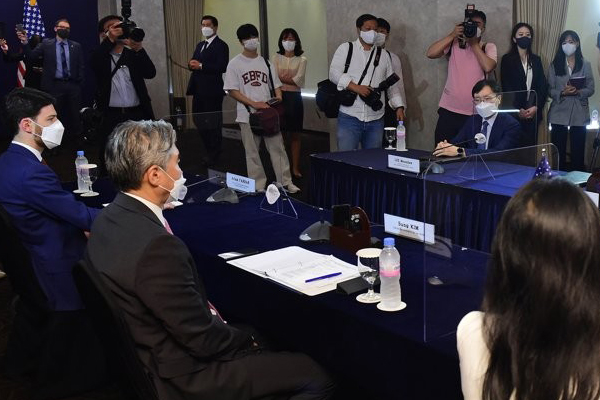The South Korean Foreign Ministry said that Seoul and Washington have agreed to consider ending the working group on North Korea issues that Pyongyang has condemned for years. Experts are split—with some arguing that the disbandment would facilitate talks with North Korea and others calling it an attempt to appease the North.
The joint consultative channel was established in November 2018 and addressed a range of issues related to the North, including denuclearization, sanctions enforcement, humanitarian aid and inter-Korean projects.
First Vice Foreign Minister Choi Jong-kun stated in a parliamentary session on June 22 that the working group faced criticism and was viewed as an impediment to inter-Korean relations, despite helping with policy coordination between the allies. Choi said a dialogue involving director general-level diplomats from both countries would be an alternative to the working group, and argued that policy coordination on the North would continue. When a lawmaker asked whether disbanding the forum was a way to draw Pyongyang back to the negotiating table, Choi said this could send a “signal” to the North.
Ned Price, the spokesperson for the U.S. State Department, commented on the working group during a June 22 briefing.
“On the issue – on the working group, what I would say is that consultation and coordination with allies, including the Republic of Korea, is a key part of the implementation of our DPRK policy. We will continue this engagement. It is most certainly not ending, far from it. And we’ll continue it through a variety of diplomatic mechanisms at all levels of our government. We’re constantly looking for ways to strengthen our cooperation as we work towards what is the end goal of the policy that we have put forward, and that is the complete denuclearization of the Korean Peninsula.”
South Korean leftists and North Korea have been accusing the working group of acting as a barrier to the progress with Pyongyang. Lee Nak-yon, former prime minister during the Moon administration and lawmaker from the ruling Democratic Party (DP), argued that the working group has always interfered with relations with North Korea and should disband under the Biden administration. South Korean Unification Minister Lee In-young said that there are concerns that the working group is limiting inter-Korean relations.
The decision to terminate the working group was made a year after the threatening comments made by Kim Yo-jong, the North Korean dictator’s sister, who called it an example of “pro-U.S. flunkeyism.”
“Even before the ink on the north-south agreement got dry, [they] accepted the “South Korea-U.S. working group” under the coercion of [their] master and presented all issues related to the north-south ties to White House,” she said on June 17 of last year. “This has all boomeranged. The south side must have been clearly aware that their acts could lead to the wanton violation of the north-south agreement when they staged war exercises and offered money running at an astronomical figure for purchasing ultra-modern weapons on the order of the U.S.”
The Moon Jae-in administration seems to hope that this signal will allow them to resume talks with North Korea, but Pyongyang continues to express its unwillingness.
President Moon Jae-in recently told Sung Kim, the American special envoy to North Korea, that he will do everything possible during the remainder of his term in office to put inter-Korean relations and U.S.-North Korea ties “on a certain track.” The president also requested that the U.S. resume talks with the North and continue in the efforts to achieve progress in negotiations in close coordination with Seoul.
Unification Minister Lee also met with Sung Kim and argued, “For the prompt resumption of talks, Korea and the United States need to move in an active and dexterous manner through consensus.” He asked the U.S. envoy for support for Seoul’s push for inter-Korean cooperation, such as efforts to combat the pandemic, reunions for families separated by the Korean War, and the Mt. Kumgang tourism project.
Regardless of this approach, Pyongyang released another official statement dismissing Seoul and Washington’s calls for negotiations.
“We are not considering even the possibility of any contact with the U.S., let alone having it, which would get us nowhere, only taking up precious time,” said Ri Son-gwon, North Korean Minister of Foreign Affairs on June 23. He also said that the ministry “welcomes the clear-cut press statement issued by the vice department director of the Central Committee of the Workers’ Party of Korea [Kim Yo-jong], which is to brush off hasty judgment, conjecture and expectation of the United States.”
Kim Yo-jong released a statement on Tuesday saying that “It seems the U.S. may interpret the situation in such a way as to seek a comfort for itself…Their expectation, which they chose to harbor the wrong way, could plunge them into a greater disappointment.” Kim was responding to the comments made by U.S. National Security Adviser Jake Sullivan that described Kim Jong-un’s mention of dialogue with the U.S. as “interesting.”
Evans Revere, former U.S. Principal Deputy Assistant Secretary of State for East Asian and Pacific Affairs, said in an interview with Voice of America, “I basically translated her remarks as ‘Not so fast Washington. Don’t think that we’re actually moving towards dialogue. You need to show us what it is that you’re prepared to do for us and give to us before we can have any sort of a dialogue.’”


